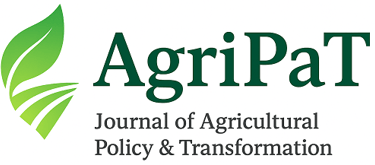Journal of Agricultural Policy & Transformation


Advancing Evidence-Based Policies for Sustainable and Inclusive Agricultural Transformation
Purpose
AgriPaT – Journal of Agricultural Policy & Transformation is committed to maintaining the highest standards of integrity, transparency, and professionalism in scholarly publishing. As a global platform for credible, high-impact research on agricultural policy, rural transformation, and sustainable food systems, our ethical framework safeguards the quality, trust, and long-term relevance of the scholarly record.
These policies ensure that every stage of publication reflects academic rigor, accountability, and respect for all participants—authors, editors, reviewers, and publishers. All stakeholders share responsibility for maintaining these values and engaging in a respectful and responsible scholarly exchange that benefits the academic community and society at large.
General Principles
All parties involved in the publication process are expected to:
Treating each other with dignity, fairness, and respect, fostering an inclusive and professional environment.
Avoid any form of discrimination, harassment, bullying, or retaliation in all communications.
Comply with the best international practices and ethical guidelines, including those of the Committee on Publication Ethics (COPE), the International Committee of Medical Journal Editors (ICMJE), the ARRIVE Guidelines for animal research, and the CONSORT Statement for clinical trials.
Uphold the principle that all manuscripts must have a similarity index of 15% or less, verified using Turnitin or an equivalent plagiarism detection tool before acceptance.
Duties of Authors
Authors play a central role in ensuring the credibility, reproducibility, and ethical soundness of published research. They are expected to:
Originality and Authorship:
Submit only original manuscripts that have not been published elsewhere or simultaneously submitted to another journal. All authors listed must have made a significant contribution to the conception, design, execution, or interpretation of the research.Plagiarism, self-plagiarism, and duplicate submissions are strictly prohibited.
A similarity score above 15% (as checked via Turnitin) will result in immediate review and possible rejection.
Research Integrity and Reporting Standards:
Present research findings accurately and transparently, avoiding fabrication, falsification, or misrepresentation of data. Methods should be clearly described to allow reproducibility.Authorship and Acknowledgment:
Authorship should reflect substantial scholarly contribution. All contributors not qualifying for authorship must be properly acknowledged. Ghost or honorary authorship is not allowed.Conflict of Interest and Funding Disclosure:
Authors must disclose all financial, personal, or institutional conflicts of interest, as well as any funding sources or sponsors influencing the research.Ethical Approval:
Research involving humans, animals, or sensitive data must comply with ethical standards and have formal approval from relevant institutional ethics committees. Informed consent must be obtained where applicable.Data Transparency and Availability:
Authors should be prepared to share data and materials supporting their findings, consistent with ethical and legal considerations.Corrections and Retractions:
Authors must promptly notify the editor if a significant error or inaccuracy is discovered post-publication, cooperating in issuing corrections or retractions when needed.
Duties of Editors
Editors are responsible for ensuring that every manuscript is evaluated fairly, objectively, and based solely on academic merit. Their responsibilities include:
Making independent editorial decisions without bias or influence from commercial, political, or personal interests.
Ensuring confidentiality of submitted manuscripts and protecting reviewer anonymity.
Avoiding the handling of manuscripts where any conflict of interest exists.
Acting promptly and transparently when concerns arise about research integrity, plagiarism, or misconduct, in consultation with the publisher and in line with COPE procedures.
Ensuring that the review process includes Turnitin plagiarism screening and that manuscripts exceeding the 15% similarity threshold are returned for revision or rejected.
Duties of Reviewers
Peer reviewers are essential to maintaining academic rigor and research credibility. They are expected to:
Provide objective, constructive, and timely feedback that enhances the manuscript’s quality and relevance.
Treat all manuscripts as confidential documents, refraining from sharing or using unpublished information for personal advantage.
Disclose conflicts of interest before accepting a review assignment.
Report suspected plagiarism, data fabrication, or ethical breaches, as well as significant overlaps with existing literature.
Publisher Responsibilities
The publisher of AgriPaT is committed to:
Ensuring editorial independence and safeguarding the integrity of the scholarly record.
Providing technical, procedural, and legal support to editors, authors, and reviewers.
Promoting best practices in ethical publishing, peer review, and open-access dissemination.
Research Misconduct and Corrective Measures
All allegations of research or publication misconduct will be investigated following COPE guidelines. Depending on the outcome, corrective actions may include:
Rejection of the manuscript before or after peer review.
Publication of corrections, retractions, or expressions of concern.
Notification to the authors’ institutions or relevant authorities.
Use of AI Tools
Generative AI or AI-assisted technologies may be used only for language editing or grammar improvement, not for creating or interpreting scientific content, data, or citations. Any such use must be explicitly disclosed in the manuscript.
Final Note
By submitting a manuscript to AgriPaT – Journal of Agricultural Policy & Transformation, all contributors agree to abide by this Ethics Policy. These principles uphold integrity, accountability, and scholarly excellence, ensuring that every publication contributes meaningfully to the advancement of agricultural policy, rural transformation, and sustainable development worldwide.
Publication Ethics and Malpractice Policy
The AgEcon Frontiers (sPvt) Ltd. (TAEF) is a knowledge-driven platform dedicated to advancing research, policy, and innovation in agricultural economics, food systems, environmental sustainability, and rural transformation. We connect scholars, practitioners, and policymakers to foster inclusive, evidence-based solutions for a resilient future.
admin@ageconfrontiers.com
© 2025. All rights reserved.
